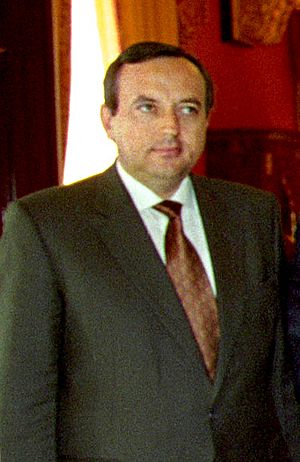Rafael Ángel Calderón Fournier facts for kids
Rafael Ángel Calderón Fournier was the President of Costa Rica from 1990 to 1994. He was a leader of the Social Christian Unity Party.
Quick facts for kids
Rafael Ángel Calderón Fournier
|
|
|---|---|
 |
|
| 41st President of Costa Rica | |
| In office 8 May 1990 – 8 May 1994 |
|
| Vice President | Germán Serrano Pinto Arnoldo López Echandi |
| Preceded by | Óscar Arias |
| Succeeded by | José María Figueres |
| Personal details | |
| Born | 14 March 1949 Diriamba, Nicaragua |
| Political party | PUSC |
| Spouse | Gloria Bejarano Almada |
| Profession | lawyer, politician |
| Signature | |
Contents
Family Life
Rafael Ángel Calderón Fournier was born on March 14, 1949, in Diriamba, Nicaragua. His parents were living in exile at the time. His father, Rafael Ángel Calderón Guardia, was also a former President of Costa Rica, serving from 1940 to 1944. His mother was Maria del Rosario Fournier Mora.
Calderón Fournier is married to Gloria Bejarano Almada. They have four children: Rafael Ángel, Gloria del Carmen, María Gabriela, and Marco Antonio. They also have six grandchildren.
Education and Early Life
Calderón started his schooling at Colegio Mexico in Mexico City. In 1958, when he was nine years old, he returned to Costa Rica. This was possible because President Mario Echandi Jiménez allowed political exiles, including Calderón's father, to return home.
He completed his secondary education at Colegio La Salle in San José, Costa Rica. Later, Calderón Fournier studied law at the University of Costa Rica.
Political Career
Rafael Ángel Calderón Fournier began his political journey at a young age. At 20, he became the President of the Youth section of the Partido Unificacion Nacional (PUN). After his father passed away in 1970, he was appointed to the board of the Caja Costarricense de Seguro Social. In this role, he helped create new rules for the country's retirement systems.
In 1974, he was elected as a congressman. He served two terms as the chairman of the Committee on Social Affairs. This committee helped pass important laws, such as the Law on Social Development and Family Allowances. This law created a pension plan for older people who had not contributed to a retirement fund, helping many thousands of elderly citizens.
Presidential Campaigns
Calderón Fournier ran for president several times. In 1982, he was a presidential candidate but was not elected. He tried again in 1986, but was also defeated.
He ran for president a third time in the 1990 elections, and this time he won. Like his father, he became president at the age of 40.
Achievements as President (1990-1994)
During his time as president, Rafael Ángel Calderón Fournier worked to improve Costa Rica's economy and public services. He focused on making the country's finances more stable.
Some of the key things he did include:
- Economic Stability: He introduced changes to the economy, trade, and finance. These changes helped make the country's economy stronger and more stable.
- Increased Production: Under his leadership, the country's production and exports grew. This brought more money into Costa Rica.
- Tourism Boom: Tourism, especially eco-tourism, became very popular. It became the top way for Costa Rica to earn foreign money, even more than bananas and coffee.
- Children's Museum: He transformed the old Central Prison into the Children's Museum. This modern and fun place is visited by many children and adults every day.
- Housing Support: He provided free housing vouchers to help families with lower incomes find homes.
- Community Homes: He encouraged the creation of community homes to care for children whose mothers were working.
- Trade Agreements: He signed a Free Trade Agreement with Mexico, which helped boost trade between the two countries.
- Fairer Pensions: He made changes to public pensions to ensure they were more fair for everyone.
- Identity for Indigenous People: He passed a law that helped indigenous people get official identification documents.
Calderón Fournier received an honorary doctorate from the University of Houston in 1991.
See also
 In Spanish: Rafael Ángel Calderón Fournier para niños
In Spanish: Rafael Ángel Calderón Fournier para niños

